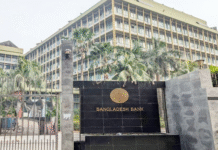
The government is reaching out to small pockets as part of its special emphasis to boost revenue collection from the non-tax sector, aiming to address the shortfall and reduce the pressure of high-cost borrowing, according to finance ministry officials.
This has prompted the Finance Division to initiate efforts to gather non-tax revenue from ministries and departments into the government treasury.
“The government is trying to maximise its own income as much as possible to minimise the strain of heavy borrowing at high interest. That is why initiatives have been taken to gather all available funds,” a senior official at the Finance Division told The Business Standard.
He said government agencies typically deposit such income before the fiscal year’s end, but the Finance Division is now urging offices to expedite the process by bringing outstanding dues to the Treasury.
To increase non-tax revenue, initiatives are being taken to reset fees in some cases, arrange online collection, and ensure automatic deposits in government accounts, the official said.
Apart from this, the ministries and departments have been instructed to return unspent money to the government treasury within the stipulated time, said the official.
In the outgoing budget, the government initially targeted Tk50,000 crore from the non-tax revenue sector but later revised it down by Tk1,000 crore, which still exceeds the Tk38,933 crore collected in FY23. The new budget for the fiscal 2024-25 sets the target at Tk46,000 crore.
In the first 11 months of the outgoing fiscal year, the National Board of Revenue collected Tk324,378 crore, averaging Tk29,489 crore per month. If the June collection maintains this pace, there will still be a shortfall of more than Tk46,000 crore from the revised target of Tk4.10 lakh crore.
According to Bangladesh Bank data as of 13 June, the government has borrowed Tk101,724 crore from the banking system.
In the outgoing budget, the government estimated a net borrowing of Tk132,395 crore from the banking system. However, this target has been revised upward by Tk23,540 crore due to lower-than-expected revenue.
According to the central bank’s latest data, the government has borrowed through Treasury bills at interest rates ranging from 11.60% to 12%.
Sectors from which non-tax revenue is collected
According to the Finance Division, non-tax revenue is collected for hundreds of services provided by various ministries and departments.
These include levies on financial and non-financial institutions, fees for registering non-profit organisations, engineering services, birth and death registration fees, fines, testing fees, inspection fees, trade mark registration fees, deed registration, sale of stamps and postage stamps, bridge, road, and ferry tolls, lease of land, and vessel registration.
Additionally, non-tax revenue is derived from various sources, such as the rent of government vehicles, examination fees, tender document fees, government school and college admission fees, fees from government institutions, and registration fees for firms and companies.
The government also collects non-tax revenue from election deposits, national identity card fees, court fees, firearms registration fees, registration fees for hotels and restaurants, the sale of forest timber and saplings, and confiscations.
Towfiqul Islam Khan, senior research fellow at the Centre for Policy Dialogue, a private think tank, told The Business Standard that the government should pay special attention to three sectors to increase non-tax revenue.
Firstly, ensuring good governance and efficiency in state-owned commercial enterprises and managing them professionally to reduce losses and increase profits. Secondly, addressing corruption in determining and collecting government service fees to align with market rates. Finally, ensuring proper utilisation of government resources.
How much revenue can be derived from where
In the revised FY24 budget, the government has set a target of Tk180 crore from the Office of the Chief Controller of Imports and Exports through import-export licence fees and Tk176 crore from the Registrar of Joint Stock Companies and Firms.
A senior official at the commerce ministry said global factors are expected to hinder growth in import and export activities, casting doubt on achieving revenue targets.
Additionally, the government anticipates Tk2,772 crore from deed registrations in the outgoing fiscal year. Around Tk300 crore is expected from various court fees under the law and justice department.
From the Security Services Division, an estimated Tk3,600 crore is projected, with the Directorate of Immigration and Passports alone expecting Tk2,653 crore from passport issuance and renewal, and Tk910 crore from other Public Security Division activities.
It is forecast that Tk1,015 crore will be generated from bridge tolls and Tk200 crore from road tolls. Furthermore, revenue projections include Tk165 crore from diving licence fees, Tk934 crore from motor vehicle registration fees, Tk111 crore from motor vehicle fitness fees, Tk100 crore each from route permit and number plate fees, and Tk50 crore from ride-sharing service provider and motor vehicle enlistment fees. The government expects to collect Tk2,500 crore from road taxes.
Overall, the government has estimated revenue of Tk6,648 crore from the Road Transport and Highways Division in FY24.
A director at the Bangladesh Road Transport Authority (BRTA) has said revenue from registration fees is not meeting targets this year due to the increase in vehicle prices. Revenue collection from other fees is also expected to fall short of the target.
The Finance Division is urging the quick transfer of forfeited election security deposits and National Identity Card fees to the government exchequer. It has been reported that the government estimates receiving Tk12 crore from forfeited election deposits in the revised budget for the FY24, along with Tk84 crore from NID fees.
The revised budget anticipates receiving Tk2,500 crore from the land development tax sector, with an additional Tk262 crore estimated from mutations.
Initiatives to collect arrears
According to the Land Reforms Board, as of June 2023, land development tax arrears amount to Tk448.87 crore owed to various agencies and institutions under 38 ministries. From July 2023 to the present fiscal year, new arrears totalled Tk84.53 crore, bringing the combined total arrears to Tk533.41 crore.
In FY24, a review of tax collection from the deputy commissioner’s office revealed that institutions under the local government ministry owe Tk59.31 crore in arrears.
A senior official from the Land Reforms Board stated that initiatives are underway to hold a special workshop in August to boost land development tax collection in FY25. Additionally, departments and ministries will receive DO letters to this effect.
TBS









